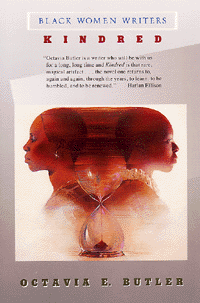Kindred by Octavia Butler
 For a little spell last week, I considered knocking a book off of my Top 20 list to make room for Kindred by Octavia Butler.
For a little spell last week, I considered knocking a book off of my Top 20 list to make room for Kindred by Octavia Butler. Ms. Butler passed away on February 24 in what seemed to be a deluge of celebrity passings. She died on the same day as Don Knotts and Dennis Weaver, so her death may have been lost to many. Being a Black Science Fiction writer probably did little to elevate her to page one news. However, those in the know were very aware of Ms. Butler's talents. Her obituary clearly reflects her value to the literary world.
Ms. Butler passed away on February 24 in what seemed to be a deluge of celebrity passings. She died on the same day as Don Knotts and Dennis Weaver, so her death may have been lost to many. Being a Black Science Fiction writer probably did little to elevate her to page one news. However, those in the know were very aware of Ms. Butler's talents. Her obituary clearly reflects her value to the literary world.
I learned of Ms. Butler's passing from one of BillyBlog's readers, Tony. Shortly thereafter, her book Kindred was suggested for our book club at the Bay Ridge Jewish Center. And so it goes.
book Kindred was suggested for our book club at the Bay Ridge Jewish Center. And so it goes.
I knew of Butler because she had been a fixture in my old home of Pasadena. She was born there, was a graduate of Pasadena City College and a Southern California treasure who often read and signed at Vroman's Bookstore in Pasadena, one of the best independent bookstores in the country.
Kindred is best summed up like so:
Dana, a modern black woman, is celebrating her twenty-sixth birthday with her new husband when she is snatched abruptly from her home in California and transported to the antebellum South. Rufus, the white son of a plantation owner, is drowning, and Dana has been summoned to save him. Dana is drawn back again and again for Rufus, yet each time the stay grows longer and more dangerous until it is uncertain whether or not Dana's life will end, long before it has even begun.

Although classified as a science fiction writer, this is no robot and alien tale. I was distinctly reminded of another classic from the 1970's, Marge Piercy's Woman on the Edge of Time (1976). There is a transportation between two periods of American history, with no scientific explanation, which makes the jumps that much more frightening.
I was riveted throughout the book. Butler's command of the language and her descriptions of life on a early 19th century Maryland plantation is terrifyingly realistic (or so it seems).
The biggest disappointment of the book is the introduction to the 25th anniversary edition which, without warning, discusses plot points that steal the thunder from the original text. One should skip the intro and go back and read it after completing the book. It detracted slightly from my enjoyment.
The concept is great and the execution is brilliant. Some may have an issue with the way it ends, but I found it fitting and poignant. I strongly recommend. I'll leave you with a link to an excerpt an Amazon here.
It's a book you won't soon forget.

1 comment:
I too would put this towards the top of my list. What was interesting was reading it during the first few nights of Passover. Slavery being at the first ad foremost of our minds made the book almost topical.
Post a Comment